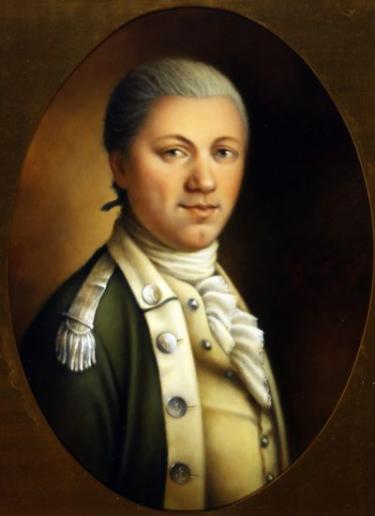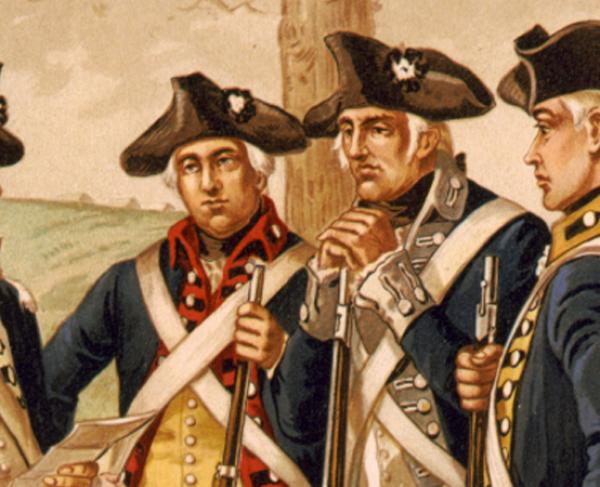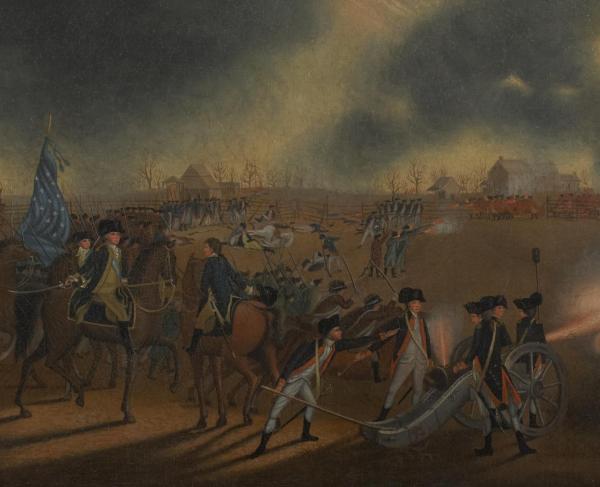
At the Battle of Princeton, the United States Marine Corps met the enemy on land for the first time. The Marines were in the thick of the fighting, participating in Washington's decisive counter attack.
The Colonial Marines, predecessor to the United States Marine Corps, was founded on November 10, 1775 under the Continental Marine Act of 1775. Their primary duty was to serve as the Navy’s infantry arm, providing security, making amphibious assaults, repelling boarders, and sweeping enemy decks with musket fire. Marines allowed the fledgling Colonial Navy to raid targets of opportunity and capture British merchant shipping.

On November 28, 1775, Congress commissioned Samuel Nicholas as Captain of Marines, and tasked him with raising two battalions. Nicholas set to work in his native Philadelphia, a town with a rich naval tradition and plenty of available sailors. Legend holds that he used Tun Tavern as his recruiting office, although some historians name the Nicholas’ family's own tavern, Conestoga Waggon [sic], as the recruitment site. By December, Nicholas had raised one battalion, 300 men; among them were the Corps’ first African Americans enlistees: Isaac Walker and a man known only as “Orange.” In early January, the Marines went to sea under Commodore Esek Hopkins.
The Marines spent the early part of 1776 at sea, raiding British shipping and territory in the Caribbean. During this time, the Corps participated in its first amphibious landing: the First Battle of Nassau, in the Bahamas. At Nassau the Marines splashed ashore unopposed and quickly occupied Fort Montagu, taking the town of Nassau the next day without firing a shot. On the return voyage, the small fleet captured a number of merchant vessels and encountered HMS Glasgow, resulting in the first naval engagement between the Royal and Continental Navies. HMS Glasgow, a heavily armed sixth-rate frigate, managed to escape despite heavy damage. During the cruise, the Marines suffered their first combat losses: seven killed and four wounded. Upon his return, Nicholas was promoted to Major on June 6.
Throughout the fall of 1776, Nicholas and his Marines were recruiting in Philadelphia and waiting for their next assignment. The land war, however, was beginning to turn against Washington and his Continental Army with the defeats at Long Island, White Plains, Fort Washington, and Fort Lee. By December of 1776, Washington was retreating through New Jersey and in desperate need of veteran soldiers. Nicholas and the Marines were ordered to attach themselves to Washington’s army.
By December 25, 1776, the Marines found themselves not at sea, but on a river. Washington, recognizing the need for sailors for his planned crossing of the Delaware, assigned the Marines to General John Cadwalader’s Brigade crossing at Burlington. The ice-choked river and deteriorating weather, however, prevented Cadwalader from landing more than a few men on the New Jersey riverbank, and prevented the Marines from participating in Washington’s stunning victory over the Hessians at Trenton.
The Marines would not have to wait long, however, for their first taste of land combat. Still attached to Cadwalader’s Brigade, they marched from Crosswicks, New Jersey, and joined Washington outside Princeton on the night of January 2, 1777. Cadwalader’s Brigade was then attached to Nathanael Greene’s Division. When the sun rose on January 3, 1777, the Marines arrived on the outskirts of Princeton. Placed in reserve initially, it seemed as if they were likely to miss the action yet again.

The British had other plans, and their sudden appearance on the King’s Highway began the engagement. The British shattered the first line of American troops under the command of Hugh Mercer. Cadwalader’s Brigade, and the Marines, would have heard the exchange of volleys and thunder of cannon from their position on the Sawmill Road near Thomas Clarke’s house. They would have seen their comrades come running out of William Clarke’s farmyard, pursued by British Redcoats, with no sign of General Hugh Mercer or his second in command, Colonel John Haslet, among them.
At this point, the battle was at its critical moment. Cadwalader ordered his inexperienced men into action, with the Marines advancing on the right flank. This advance would have placed the Marines near the fence between William and Thomas Clarke’s farms, close to the present day boundary between Princeton Battlefield State Park and the Institute for Advanced Study (IAS). These troops managed to slow the British, but the intense musketry, artillery, and the flight of Mercer’s men through their ranks unnerved them. Cadwalader’s men began to break.
Thanks to quick thinking by Capt. Joseph Moulder and his battery of Pennsylvania Artillery, and accurate grapeshot and canister salvos, the British advance was halted. Washington arrived on the field, riding among Cadwalader’s men shouting “parade with us my brave fellows, there is but a handful of the enemy and we will have them directly!” At great personal risk, Washington rallied Cadwalader’s and some of Mercer’s men. With reinforcements from Sullivan’s Division--Col. Daniel Hitchcock’s Brigade supported by Col. Edward Hand’s riflemen and two batteries of artillery--the Marines and Cadwalader’s men renewed the attack and drove the British from the field.
For the first time in the Revolution, Washington and his men saw the fleeing backs of British Redcoats. Of the estimated 130 Marines engaged at Princeton, no known casualty list exists. The entire army suffered eight officers and about thirty men killed. In Cadwalader’s Brigade three casualties are known, Ensign Anthony Morris, Lt. Morgan, and a Pennsylvania Marine, Capt. William Shippin. The Pennsylvania Marines were from the Brig Hancock, a privateer where Shippin was Captain of Marines. These state Marines fought with the Philadelphia Militia in Cadwalader’s center and left flank.
Given the losses in Cadwalader’s Brigade, the Continental Marines likely suffered in equal numbers. It is possible that some of the unknown Marine casualties still lie buried in the mass grave within Princeton Battlefield State Park. The Battle of Princeton was the first in a long line of battles where the Continental Marines were called to action far from their ships.
Related Battles
75
270


